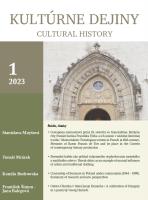Censorship of literature in Poland under communism (1944 – 1990)
Censorship of literature in Poland under communism (1944 – 1990)
Summary of research and new perspectives
Author(s): Kamila BudrowskaSubject(s): History, Political history, WW II and following years (1940 - 1949), Post-War period (1950 - 1989), History of Communism
Published by: VERBUM - vydavateľstvo Katolíckej univerzity v Ružomberku
Keywords: censorship; communism; Polish literature; People’s Poland
Summary/Abstract: In the article the author addresses the problem of censorship of literature in Poland during the communist years. The introduction describes the basic assumptions of communist censorship and emphasizes Poland’s close dependence on the USSR. The state of research on communist censorship in the former Eastern Bloc is briefly outlined in order to provide background for the discussion of the communist censorship in Poland. The methods of Polish censors are also described: preventive censorship, making two reviews, eliminating a part of the text or banning the printing of the whole text. The main part of the article details the methods of censorship in Poland by period (a chronological aspect), characterizes the banned topics (political, moral and ideological censorship) and gives examples of authors who had trouble with publishing. It also discusses the differences between censorship of Polish contemporary literature, classics and translations from foreign languages. It is argued that the existence of state control determined the peculiarity of Polish literature during the communist period. Censorship influenced the formation of the canon and restricted the development of some topics and aspects of poetics. Furthermore, state control destroyed the careers of writers and a broader potential of literature. Finally, the translations of important texts of world literature were not allowed to be printed or were very late, which resulted in the isolation of Polish literature (and readers). In the last part of the article the author presents new perspectives for further research: a transnational, postcolonial and “minority narrative” perspective.
Journal: Kultúrne dejiny
- Issue Year: 14/2023
- Issue No: 1
- Page Range: 44-66
- Page Count: 23
- Language: English

